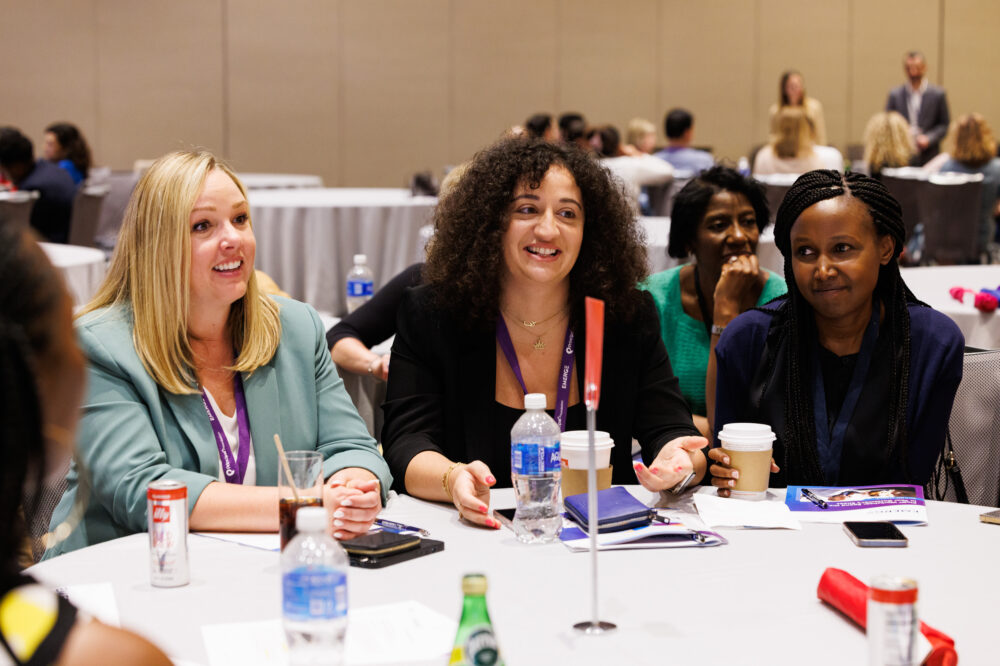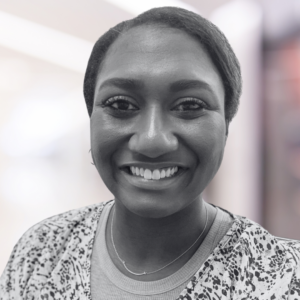Lessons From FinX: The Challenges of Financially Vulnerable Consumers
The lessons learned and insights gained from FinX, a unique workshop that illuminates the challenges faced by financially vulnerable consumers.
-
Program:
-
Category:

At the 2024 EMERGE Financial Health conference, 120 attendees participated in our pre-conference FinX Workshop: Spend the Day in Your Customer’s Shoes, sponsored by Prudential Financial. Taylor Rysdon, a new addition to the Financial Health Network team, participated in her first FinX at the conference. Below, she reflects on her experience and connections to her past.
Pre-FinX
Growing up just south of Chicago, my single mother worked hard to give me a better life than she had. We lived in a mostly white, middle-class suburb, and as one of the few Black kids, we often felt out of place. Even though my mom made a comfortable wage and we didn’t struggle for the essentials, she knew opportunities would be more abundant in less minority-dense suburbs. We know that neighborhoods matter – there is a relationship between where people live and their financial health outcomes. Research by the Financial Health Network indicates that financially healthier people tend to live in neighborhoods with greater access to resources such as clean water and air, safety, high-quality medical care, and places to buy healthy food. Meanwhile, financially vulnerable people are more likely to live in neighborhoods with higher rates of poverty, unemployment, and financial distress.
With many children across the country preparing to return to the classroom, families are carrying the weight of back-to-school expenses. Increased living expenses make shopping for student needs nearly impossible for underserved populations. Many people often have to decide between feeding their families and purchasing school supplies for their children.
FinX Insights: A Firsthand Account
I took my seat in the FinX workshop, confident that I was fully mentally and physically prepared to walk in the shoes of someone facing financial struggles. I mean, I’ve seen my mom make $20 in cash stretch for more than a week. How hard could it be? Introducing ourselves to one another, my group members and I had no idea what we were in for. Workshop facilitators shared how the half-day, immersive experience would work. Each randomly assigned group received the same amount of time to cash their checks and complete a list of tasks using just the money allotted, but we only had so much time. Our group received a check for $80 and a checklist of tasks to complete in the real-world environment. One of the first missions: public transportation.
We hit the streets of downtown Chicago and quickly realized how time consuming it can be for someone who is financially vulnerable to navigate basic financial tasks. Many don’t have access to mobile check deposits so these individuals often find themselves traveling across town to cash their check. This often results in losing time and spending money to access their funds. Time quickly slipped away from our group as we rushed to cash our check and tackle tasks like buying diapers, getting a money order, and applying for a loan.
“FinX was one of the most eye opening and humbling experiences I’ve ever had. You don’t realize what many people go through until you’ve walked in their shoes. Having this experience pushed me to be even more passionate about financial health and the impact it has on so many!”
– Lori Horstman, Vice President, Member Experience and Advocacy at Altra Federal Credit Union
Our group frequently encountered inconsistent information and judgment when interacting with store clerks, making it all the more time consuming to complete our tasks. We visited two branches of the same bank and an employee at one location said the company offered money orders, while an employee at the other branch said the company did not. There was an overarching feeling with the staff in these spaces that we didn’t belong due to our lack of knowledge and funds.
The Financial Health Network’s 2024 FinHealth Spend Report shows that the burden of fees and interest for financial services tends to fall more heavily on households that are already struggling. Financially Vulnerable households spent an average of 16% of their income on interest and fees in 2023, while Financially Healthy households paid only 1%. Learn more about how much U.S. households pay each year for financial products and services in our latest research.
It felt nearly impossible for our group to complete all the tasks. The lack of financial resources led to a lack of time, and everything we sought to accomplish felt like it took much longer to complete as a financially vulnerable customer. With a very small budget, we had to focus on the necessities which meant we compromised our preferences. For example, one of our tasks was to purchase $20 worth of groceries for a week. In an ideal world, I would have preferred fresh, organic produce but it was much too expensive. Then I thought about my family of five back home. There’s no way we could survive two days on a $20 budget. My group, like many families navigating low- to-moderate financial circumstances, had to stretch every dollar by opting for large bags of rice and canned beans over pricier options like organic produce.
My journey with FinX highlighted some harsh realities:
-
- Limited time due to limited resources: Many families don’t have the time or means to manage their tasks efficiently. Limited access to high-quality financial services and complicated benefits systems create a time-consuming burden on families who are already facing daily financial challenges.
- Financial institutions aren’t fully aware of consumer needs: Effective solutions meet the real, material needs of financially struggling consumers, but many solutions that are currently available fail to do so.
- Compromised decision-making: Many people have to make quick, tough decisions with limited time, like buying diapers and managing finances during a lunch break. Quick decisions don’t always mean cost-effective decisions.
“FinX was a chance for me to experience how expensive it is to be poor. I’ve never had to get a payday loan, I don’t have to worry about paying fees to cash my payroll check, and I haven’t had to think about where I could quickly get $500. FinX opened my eyes to the millions of Americans who spend their time and energy trying to navigate these obstacles. I walked away feeling inspired.”
– Kendra Wheeler, Financial Wellness Program Manager, Vice President at Bangor Savings Bank
Despite the challenges we faced, the resilience and creativity of individuals shone through. In just 90 minutes, my group learned to maximize our resources by smartly managing our time and finding bargains – just as my mother did. It’s clear that people are incredibly inventive and resourceful in dealing with their financial challenges, even when tasked with navigating complex systems that make it difficult to access resources. I’d love to see a world that exists with less complex systems and more accommodating services.
Thank you, Taylor, for sharing your story with us.
Bring FinX to Your Team
Creating a financially inclusive and healthy future will require all of us working together to understand and support the financial lives of our greater community, especially the most vulnerable among us. FinX provides a unique opportunity to experience the daily challenges of your customers, employees, and communities, equipping you with insights to create impactful financial services and products. If you’d like to bring the FinX experience to your team, we’d love to hear from you.
Supporting consumer financial health requires empathy for those who face daily financial challenges, but rarely do industry leaders have an opportunity to step into the shoes of financially struggling consumers. That’s why the Financial Health Network created FinX, a unique, immersive team-building workshop. Participants gain new perspectives by conducting real-world activities like cashing checks, transferring money, and handling prepaid cards as financially vulnerable consumers.
In June, the Financial Health Network celebrated 20 years of advancing financial health. As we forge new connections, reassess our progress, and envision future transformations, we’ll be laying the groundwork for a more financially inclusive society. In the meantime, be sure to check out the materials from this year’s EMERGE Financial Health to catch up on the latest insights and developments.
Keynote Address: Building the Future
Hear from Financial Health Network President and CEO Jennifer Tescher as she celebrates 20 years of financial health and lays out the hard work ahead.
Financial Health Visionary Award: A Fireside Conversation with Our New Honoree
See the highlights from our fireside conversation with our new Financial Health Visionary Award honoree Brian Moynihan, Chair of the Board and Chief Executive Officer at Bank of America. Learn about his commitment to financial health, the critical issues that will impact our progress, and how they’re already making a mark on our community’s next chapter.
The Next Generation of Financial Health
From FinTok to loud budgeting, younger generations are approaching their finances in new ways. Learn about their unique financial habits and how financial institutions can best support them as they work toward financial independence.




